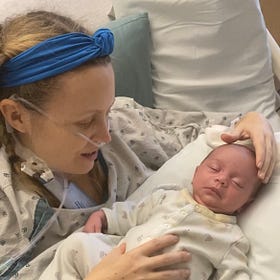This newsletter is a reader-supported publication. If you find value in this work, please consider becoming a paid subscriber. For the cost of a latte, paid subscriptions are the fuel that keeps me doing this work. Thank you for your support!
Hello beautiful, RDG Readers!
I remember surviving the hospital experience to finally come home to my baby and stacks of mail from my insurance company denying the exact infusion medicine that saved me. Luckily, my doctors just gave me all the doses I needed to live without question, only to solve the insurance challenge later.
Not everyone gets that kind of care, and I’ll always be grateful that my medical team acted in my best interest. I’m still here because they did the right thing.
I’ve railed about the challenges of the system before - telling folks to always appeal, because the big reality (or what the insurers don’t want you to know) is that 83.2% of medical insurance denials are overturned.
However despite this high rate, only 18% of doctors always appeal due to various reasons like limited time and resources or the patient needing care more immediately and they’ll try another option.
But sometimes, there are not other options.
So I wanted to walk you through the denial to appeal process and provide folks with a map for how this goes.
I go through this process a lot more than I’d like - so here’s a guide. Save it for later! You will likely need it at some point.
How to Appeal an Insurance Denial
Stage 1 - The Denial
The cringiest part of the process - you read that they deny your treatment.
Feel free to say all the curse words you like at the letter. But then breathe because the odds are on your side.
Alternatively, you find out over the phone when you’re expecting to get a drug delivery or order from the pharmacy.
Don’t panic. Remember, this is a negotiation. This “no” is not set in stone.
In most cases in my experience, some AI bot flagged it and they just need more information to process the approval.
But, no matter the reason, we gotta get organized.
Stage 2 - Information Gathering
First, I alert my doctor that the denial is happening so they can begin work on their side.
Second, I call my insurance company’s customer service line. You want to get more information from them - like, is this care not included in the plan altogether?
Sometimes it’s simply an administrative mistake and you can fix it on the line, like a misspelling of the name or an error made by the provider or maybe the order was made too soon (this happens with medications a lot).
Ask if you can get the codes - sometimes there’s a mistake or a confusion in the Prior Authorization. As I’ve mentioned PA’s are a headache for doctors too.
“For the medications or procedures that do require prior auth, it's a bit of a guessing game. We don't actually know what piece of information the health insurer is looking for, so we send a bunch of explanations,” said Dr. Jack Resneck Jr., MD, a dermatologist and past president of the AMA. “But if it doesn't exactly match what the health plan employee is looking for on their computer screen, then oftentimes it won't get approved—even if it's justified and evidence-based.”
Often it’s just not covered by the plan. And services previously covered can change periodically causing frustration to everyone too. Just because something used to be covered doesn’t mean it will remain covered by insurance.
In my anecdotal experience, commonly insurers just need more information and context to explain why you have a diagnosis or need a treatment. Your doctor can provide that information in the appeal.
Other common possible denials include going out-of-network (so do your homework), requiring step-therapy (aka you gotta try a cheaper drug first) or the insurer doesn’t feel the treatment or care is medically necessary or appropriate.
This is when I start to roll up my sleeves and get to work. If you’re on the phone with someone, be sure to take good notes. Ask for a good call-back number too. Be charming, empathetic, and polite to anyone on the phone. It’s okay to feel angry - but don’t put that anger on someone who’s not responsible.
They may ask if you want to start the appeal over the phone. Say no. You want to loop in your physician on all the information you get. It’s essential you work with your doctor on the appeal.
But do get any deadlines involved for the appeal. If it’s something that needs to happen right away - you can have your doctor ask for expedited review. (My least favorite is when you ask for the expedited review and the insurance decides it’s not necessary to be expedited, but it’s a timed medication where a flare could land you in an ICU. And then you have to appeal the expedited review AS WELL. They don’t know what they are doing.)
Get all the necessary fax numbers and confirm the insurance company has your doctor’s correct contact/fax information.
The American medical system runs on fax machines- and I face a SHOCKING amount of delays due to offices having the wrong fax number or contact information.
Stage 3 - Work with your doctor’s office to craft the appeal
In many cases, your doctor’s office will handle filing the appeal from here. Do confirm the office will file the appeal so you can be sure it’s not on you. Get the name of the individual managing the appeal so you can check-in and follow-up. Make sure they also have the correct contact and fax number for the appeal.
You can also ask them to put the bill on hold while this gets processed if it was for their services.
Also I’ve written about some organizations that are using AI to help folks craft the appeal. These are free services and they tout results: https://fighthealthinsurance.com and https://persius.org.
The doctor’s office can provide a Letter of Medical Necessity, any tests, and supplemental literature to advocate for the treatment.
Then confirm when the appeal package was sent, because you can help with the next steps.
Stage 4 - The Charming Squeaky Wheel Follow-up
I like following up a day or so after I know the appeal was sent with the insurance company. Especially if it’s expedited.
Ask when they expect a decision to be made and mark it on your calendar. Take notes, get their name, and get the timeline. Keep track of when you called, when the appeal was sent, and when they guess a decision will be made.
Call them back the day they told you the decision would be made. Patients are often the most effective at making sure this process isn’t stalled.
I’m a bulldog - but I’m very charming. You don’t want them to mark you as problematic in the notes. Customer Service folks love to drop a call to get you to go away - but if you’re friendly and appeal to their hearts, you can turn them into your advocates. I see it happen all the time.
Stage 5 - The Decision
Hopefully, you get a yes at this point. Congratulations! Get some celebratory happy hour treat!
If not, pop a piece of good cheese in your mouth, because it’s not over.
Talk to your doctor and get a plan together. They have external appeals and internal appeals.
Internal appeals can go a couple rounds. Often, it’s more information again they just want to see. Or they have questions about the first appeal that need clarification. This can include a Peer to Peer Review where your doctor talks to their Medical Director.
External appeals usually happen after internal appeals unless the procedure is dire. This typically involves an review by an outside independent organization.
From here, if you still get a denial after the internal and external appeal, the next steps can differ by state - but if you still experience issues after these reviews you may want to loop in a lawyer, the Federal External Review board (if applicable), and then file a complaint with the appropriate regulatory agencies. Consumer advocacy groups might also be able to provide insight.
Other Resources
The Patient Advocate Foundation has great explainers in multiple languages. Check them out! Here is their appeal guide.
For Medicare, the appeal is similar to commercial insurance. Your state should have a free assistance program or SHIP if you need help. For Medicaid, the appeal process is federally required and protected - but check your state’s medicaid page for specifics.
In the end, persistence matters here. And that can be so hard when our health isn’t great. Get support from caregivers and friends to assist - we don’t have to do this alone.
Insurance denials are just a tactic to delay paying for care. It’s not personal.
Remember, you deserve the best care possible.
These are big behemoths, but don’t be daunted. Their profits should remind you - that’s money we paid for our healthcare. That’s our money. They hope we will just go away. But if we don’t, again the odds are in our favor.
Have you had success with appeals!? Let’s share our wins. No pressure to provide medical details- but it’s great to celebrate these successes
Comment of the Week
“Managing your own healthcare while also being a patient is hard, they’re both full time jobs, and take our full attention. I’m proud of you for advocating so hard for yourself and am so glad you found a team to fight for / with you. Thank you for sharing your journey with us.” Julianne
One Secret Insurance Companies Don't Want You To Know
Welcome Beautiful Readers. I’ve learned a lot of lessons the hard way on this journey. One lesson I find particularly bitter involves prior authorizations.
If you’re new here and wondering, “what happened to this lady?” read:
Welcome to my disease. What is atypical Hemolytic Uremic Syndrome (aHUS) or Complement-Mediated Thrombotic Microangiopathy (CM-TMA)?
Hi, If you’re new here, I started writing a book six months ago when I was on dialysis. It’s intended to be both memoir and a practical tool to help folks who might be going through something similar or those caregivers and family supporting someone with a challenging diagnosis. I hope to include excerpts here as I write. NOTE: This is not intended to r…
I started writing this when I was on dialysis. It’s intended to be both memoir and a practical tool to help folks who might be going through something similar or those caregivers and family supporting someone with a challenging diagnosis. NOTE: This is not intended to replace actual medical guidance. Please consult your doctors on your individual challenges and situations. Please talk to your clinicians before adjusting any of your care protocols. Also names have been changed for most of my medical staff.
THANK YOU, NEW PAID SUBSCRIBERS!
Thank you to Katie McUpton, Dienna D’Olimpio Harada, CC Couchois, Roy Lenn, and Dr. Richard Burwick for your founding level donation.






Great Advice, Taylor. As you know I'm not based in the US but I know a little about the system and many of the Carer Mentor readers are US based. Could I share your article in the Giving/Receiving Care Anthology?